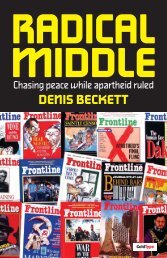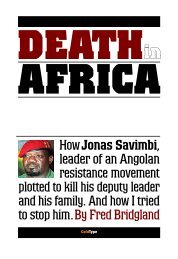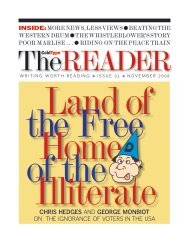UPDATED - ColdType
UPDATED - ColdType
UPDATED - ColdType
- TAGS
- updated
- coldtype
- coldtype.net
You also want an ePaper? Increase the reach of your titles
YUMPU automatically turns print PDFs into web optimized ePapers that Google loves.
had taken off. This time, there were 37 of us. I<br />
was again the only American journalist there,”<br />
Arnett said.<br />
MEDIA AT RISK<br />
HE did not rule out the possibility of an attack on<br />
Western media targets in Iraq along the lines of<br />
the bomb that went off at the hotel housing NBC.<br />
He said many Iraqis working for Western companies<br />
and media were under threat. There are<br />
half a dozen very good newspapers and in six<br />
months there could be more broadcasts too.<br />
“I just bought a satellite TV for US$ 105 with 320<br />
channels,” he confided. “There is more Iraqi<br />
environment in the media, but US still dominates.”<br />
He pointed out that the U.S. has won the<br />
war, but has lost the information war. “Today, it is<br />
impossible for anyone to control the media.<br />
There is no embedding anymore.” On this point,<br />
I was struck by a report in the Guardian that<br />
many of the Iraqi minders in Saddam’s Ministry<br />
of Information whom western journalists denounced<br />
for obstructing coverage are now working<br />
for western news organizations.<br />
PILING ON WESTERN MEDIA<br />
THERE was an ongoing debate between Arab<br />
journalists and their western counterparts. Jihad<br />
Al Khazen of the Al-Hayat newspaper, a long<br />
time Reuters correspondent claimed that the<br />
Arab media was more objective in its coverage of<br />
the Iraqi war compared to western media”. Clive<br />
Myrie, a BBC correspondent who had been<br />
embedded with British forces in Basra disagreed<br />
and, said that the issue should not be reduced to<br />
a beauty contest between the Arab and western<br />
OCTOBER POSTSCRIPT<br />
287<br />
media. “We are all involved in getting to the<br />
truth and that is what we should be doing,” he<br />
said.<br />
He argued that the western media is not a single<br />
monolith that thinks alike but consists of various<br />
perspectives and processes. He was very<br />
candid about the limits of the embedding<br />
process and shared some of his criticisms of the<br />
US coverage with me in an interview I did for a<br />
film I am doing on the media coverage of the war.<br />
Also critical: Yousef Ibrahim, the former New<br />
York Times correspondent, who covered the first<br />
Gulf War. He combined his critique with praise<br />
for Arab satellite TV outlets “The brilliant part is<br />
that we now have a voice that is listened to at the<br />
CIA and at the White House. It is now a question<br />
of quality. We have an opportunity now. Arab<br />
satellites have become a force to shape public<br />
opinion and finally, the Arab world has an outlet<br />
to answer the Western media back.”<br />
Al Arabia Editor-in-Chief Abdullah Bra Aswan,<br />
was also supportive of the new very competitive<br />
Arab TV. “Arab satellite TV is opening up the<br />
minds of the people. They now know about corruption<br />
and the other ills...We may have lost the<br />
war, but we have won the media battle. For the<br />
first time we can make our voices heard.”<br />
MONOPOLY BROKEN<br />
AN often quoted US based expert on the Arab<br />
world, Dr. Hisham Sharabi, of Georgetown University<br />
said the Western and Arab Media view<br />
each other with a distorted eye. But added that<br />
the monopoly of the Western media has been<br />
broken by the new Arab media led by the likes of<br />
Al Jazeera and Abu Dhabi TV.<br />
A more fascinating view of Arab media was

















